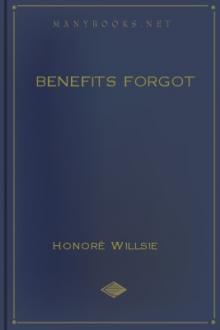Satyricon, vol 6, Editor's Notes by Petronius (easy readers .txt) 📕
- Author: Petronius
- Performer: -
Book online «Satyricon, vol 6, Editor's Notes by Petronius (easy readers .txt) 📕». Author Petronius
Aristophanes, Lysistrata: (Lysistrata speaking) “And not so much as the shadow of a lover! Since the day the Milesians betrayed us, I have never once caught sight of an eight-inch-long dildo even, to be a leathern consolation to us poor widows.” Her complaint is based upon the fact that all the men were constantly absent upon military duty and the force of the play lies in her strategic control of a commodity in great demand among the male members of society. Quoting again from the same play: Calonice: “And why do you summon us, Lysistrata dear? What is it all about?” Lysistrata: “About a big affair.” Calonice: “And is it thick, too’?” Lysistrata: “Indeed it is, great and big too.” Calonice: “And we are not all on the spot!” Lysistrata: “Oh! If it were what you have in mind, there would never be an absentee. No, no, it concerns a thing I have turned about and about, this way and that, for many sleepless nights.” When the plot has been explained, viz.: that the women refuse intercourse to their husbands until after peace has been declared—Calonice: “But suppose our poor devils of husbands go away and leave us”’ Lysistrata: “Then, as Pherecrates says, ‘we must flay a skinned dog,’ that’s all.”
Lucian, Arnoures, says: “but, if it is becoming for men to have intercourse with men, for the future let women have intercourse with women. Come, O new generation, inventor of strange pleasures! as you have devised new methods to satisfy male lust, grant the same privilege to women; let them have intercourse with one another like men, girding themselves with the infamous instruments of lust, an unholy imitation of a fruitless union.”
Herondas, Mime vi:
KORITTO | Two women friends METRO | A Female Domestic.
Time, about 300 B. C.
Scene, Koritto’s sitting room.
KORITTO: (Metro has just come to call) Take a seat, Metro; (to the slave girl) Get up and get the lady a chair; I have to tell you to do everything; you’re such a fool you never do a thing of your own accord. You’re only a stone in the house, you’re not a bit like a slave except when you count up your daily allowance of bread: you count the crumbs when you do that, though, and whenever the tiniest bit happens to fall upon the floor, the very walls get tired of listening to your grumbling and boiling over with temper, as you do all day long—now, when we want to use that chair you’ve found time to dust it off and rub up the polish —you may thank the lady that I don’t give you a taste of my hand.
METRO: You have as hard a time as I do, Koritto, dear—day and night these low servants make me gnash my teeth and bark like a dog, just like they do you.—But I came to see you about—(to the slave girl) get out of here, get out of my sight, you trouble maker, you’re all ears and tongue and nothing else, all you do is to sit around Koritto—dear, now please don’t tell me a fib, who stitched that red dildo of yours?
KORITTO: Metro, where did you see that?
METRO: Why Nossis, the daughter of Erinna, had it three days ago. Oh but it was a beauty!
KORITTO: So Nossis had it, did she? Where did she get it, I wonder?
METRO: I’m afraid you’ll say something if I tell you.
KORITTO: My dear Metro, if anybody hears anything you tell me, from Koritto’s mouth, I hope I go blind.
METRO: It was given to her by Eubole of Bitas, and she cautioned her not to let a soul hear of it.
KORITTO: That woman will be my undoing, one of these days; I yielded to her importunity and gave it to her before I had used it myself, Metro dear, but to her it was a godsend—, now she takes it and gives it to some one who ought not to have it. I bid a long farewell to such a friend as she; let her look out for another friend instead of me. As for Nossis, Adrasteia forgive me. I don’t want to talk bigger than a lady should—I wouldn’t give her even a rotten dildo; no, not even if I had a thousand!
METRO: Please don’t flare up so quickly when you hear something unpleasant. A good woman must put up with everything. It’s all my fault for gossiping. My tongue ought to be cut out; honestly it should: but to get back to the question I asked you a moment ago: who stitched the dildo? Tell me if you love me! What makes you laugh when you look at me? What does your coyness mean? Have you never set eyes on me before? Don’t fib to me now, Koritto, I beg of you.
KORITTO: Why do you press me so? Kerdon stitched it.
METRO: Which Kerdon? Tell me, because there are two Kerdons, one is that blue-eyed fellow, the neighbor of Myrtaline the daughter of Kylaithis; but he couldn’t even stitch a plectron to a lyre—the other one, who lives near the house of Hermodorus, after you have left the street, was pretty good once, but he’s too old, now; the late lamented Kylaithis—may her kinsfolk never forget her—used to patronize him.
KORITTO: He’s neither of those you’ve mentioned, Metro; this fellow is bald headed and short, he comes from Chios or Erythrai, I think—you would mistake him for another Prexinos, one fig could not look more like another, but just hear him talk, and you’ll know that he is Kerdon and not Prexinos. He does business at home, selling his wares on the sly because everyone is afraid of the tax gatherers. My dear! He does do such beautiful work! You would think that what you see is the handiwork of Athena and not that of Kerdon! Do you know that he had two of them when he came here! And when I got a look at them my eyes nearly burst from their sockets through desire. Men never get—I hope we are alone —their tools so stiff; and not only that, but their smoothness was as sweet as sleep and their little straps were as soft as wool. If you went looking for one you would never find another ladies’ cobbler cleverer than he!
METRO: Why didn’t you buy the other one, too?
KORITTO: What didn’t I do, Metro dear’? And what didn’t I do to persuade him’? I kissed him, I patted his bald head, I poured out some sweet wine for him to drink, I fondled him, the only thing I didn’t do was to give him my body.
METRO: But you should have given him that too, if he asked it.
KORITTO: Yes, and I would have, but Bitas slave girl commenced grinding in the court, just at the wrong moment; she has reduced our hand mill nearly to powder by grinding day and night for fear she might have four obols to pay for having her own sharpened.
METRO: But how did he happen to come to your house, Koritto dear? You’ll tell me the truth won’t you, now?
KORITTO: Artemis the daughter of Kandas directed him to me by pointing out the roof of the tanner’s house as a landmark.
METRO: That Artemis is always discovering something new to help her make capital out of her skill as a go-between. But anyhow, when you couldn’t buy them both you should have asked who ordered the other one.
KORITTO: I begged him to tell me but he swore he wouldn’t, that’s how much he thought of me, Metro dear.
METRO: You mean that I must go and find Artemis now to learn who the Kerdon is—good-bye KORITTO. He (my husband) is hungry by now, so it’s time I was going.
KORITTO: (To the slave girl) Close the doors, there, chicken keeper, and count the chickens to see if they’re all there; throw them some grain, too, for the chicken thieves will steal them out of one’s very lap.
THE CORDAX.
A lascivious dance of the old Greek comedy. Any person who performed this dance except upon the stage was considered drunk or dissolute. That the dance underwent changes for the worse is manifest from the representation of it found on a marble tazza in the Vatican (Visconti, Mus. Pio-Clem. iv, 29), where it is performed by ten figures, five Finns and five Bacchanals, but their movements, though extremely lively and energetic, are not marked by any particular indelicacy. Many ancient authors and scholiasts have commented upon the looseness and sex appeal of this dance. Meursius, Orchest., article Kordax, has collected the majority of passages in the classical writers, bearing upon this subject, but from this disorderly collection it is impossible to arrive at any definite description of the cordax. The article in Coelius Rhodiginus. Var. Lect. lib. iv, is conventional. The cordax was probably not unlike the French “chalhut,” danced in the wayside inns, and it has been preserved in the Spanish “bolero” and the Neapolitan “tarantella.” When the Romans adopted the Greek customs, they did not neglect the dances and it is very likely that the Roman Nuptial Dance, which portrayed the most secret actions of marriage had its origin in the Greek cordax. The craze for dancing became so menacing under Tiberius that the Senate was compelled to run the dancers and dancing masters out of Rome but the evil had become so deep rooted that the very precautions by which society was to be safeguarded served to inflame the passion for the dance and indulgence became so general and so public that great scandal resulted. Domitian, who was by no means straight laced, found it necessary to expel from the Senate those members who danced in public. The people imitated the nobles, and, as fast as the dancers were expelled, others from the highest and lowest ranks of society took their places, and there soon came to be no distinction, in this matter, between the noblest names of the patricians and the vilest rabble from the Suburra. There is no comparison between the age of Cicero and that of Domitian. “One could do a man no graver injury than to call him a dancer,” says Cicero, Pro Murena, and adds: “a man cannot dance unless he is drunk or insane.”
Probably the most realistic description of the cordax, conventional, of course, is to be found in Merejkovski’s “Death of the Gods.” The passage occurs in chapter vi. I have permitted myself the liberty of supplying the omissions and euphemisms in Trench’s otherwise excellent and spirited version of the novel. “At this moment hoarse sounds like the roarings of some subterranean monster came from the market square. They were the notes, now plaintive, now lively, of a hydraulic organ. At the entrance to a showman’s travelling booth, a blind Christian slave, for four obols a day, was pumping up the water which produced this extraordinary harmony. Agamemnon dragged his companions into the booth, a great tent with blue awnings sprinkled with silver stars. A lantern lighted a black-board on which the order of the program was chalked up in Syriac and Greek. It was stifling within, redolent of garlic and lamp oil soot. In addition to the organ, there struck up the wailing of two harsh flutes, and an Ethopian, rolling





Comments (0)